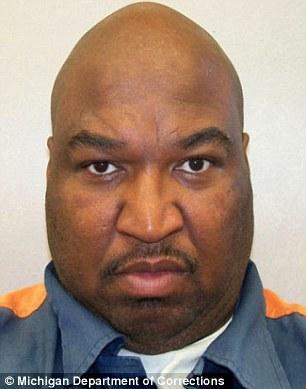Keep in mind the Mission Statement of the Michigan Department of Corrections: “We create a safer Michigan by holding offenders accountable while promoting their success.”

Convict Malcolm Benson
Via Daily Mail: A convicted murderer who was released early for good behavior has been sentenced to life in prison after killing again months after he was set free.Malcolm B. Benson, 50, of Wayne County, Michigan, was 29 when he was first charged with first-degree murder in 1995 – but entered a plea deal so he would not spend his whole life behind bars. He was sentenced to between 20 and 40 years in prison for second-degree murder and two more for felony use of a firearm – and served just over 19 years.
If Michigan’s current sentencing rules were in effect, he would have had to serve at least 22 and would not have been free until 2017, according to MLive. But instead, he was freed on parole in January last year.

Victim Stanley Carter
On September 23, 2015, he robbed and shot dead 59-year-old Army veteran Stanley Carter at a bus stop in Highland Park, according to CBS Detroit. This week, he was sentenced to life in prison.A spokesman for the Michigan Department of Corrections said Benson was freed in 2015 because Truth in Sentencing guidelines did not come into effect until 1998. (FYI: The tagline on the Corrections web site states, “Committed to Protect, Dedicated to Success.”)
‘His offense occurred in 1995, when we still allowed disciplinary credits,’ Holly Kramer told MLive. ‘Disciplinary credits allowed for parole eligibility to be accelerated for an indeterminate sentence, like his 20 to 40 years, if a prisoner had good behavior.
‘After Truth in Sentencing, disciplinary credits were eliminated and offenders sentenced after 1998 had to serve at least their entire minimum sentence.’ She added that any accrued good behavior credit was removed if an offense was committed in prison.
DCG

